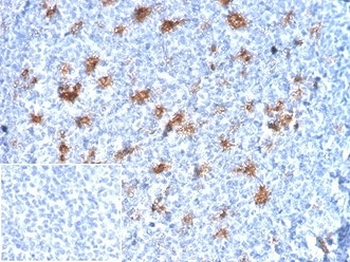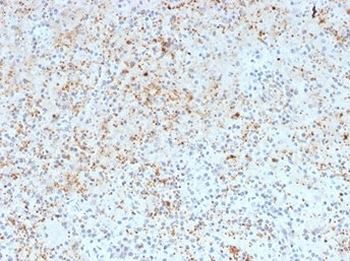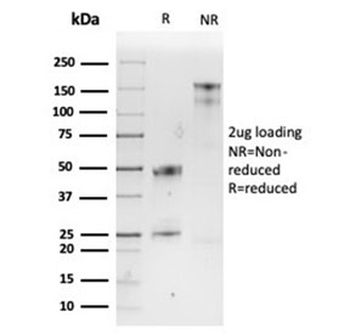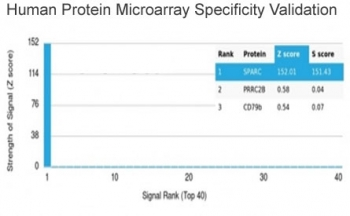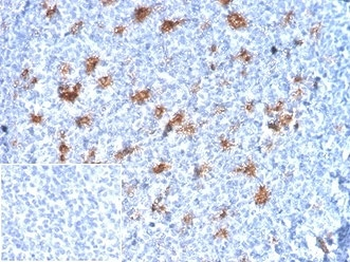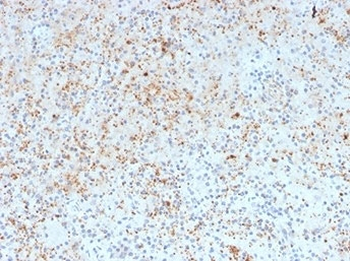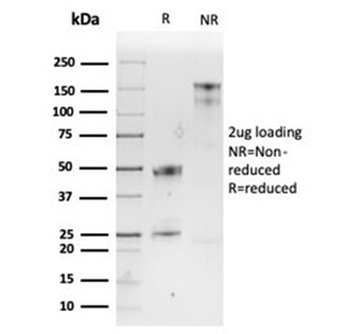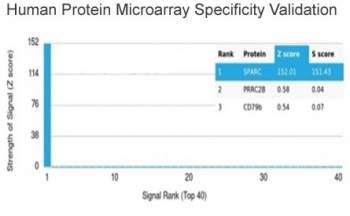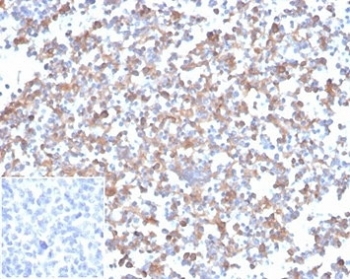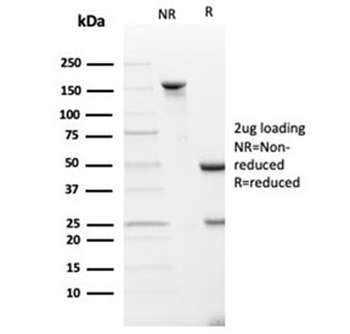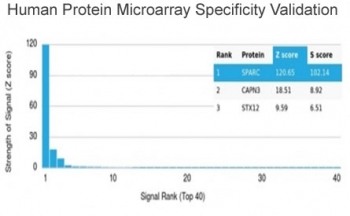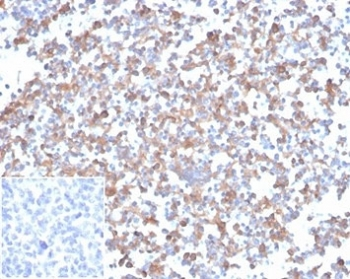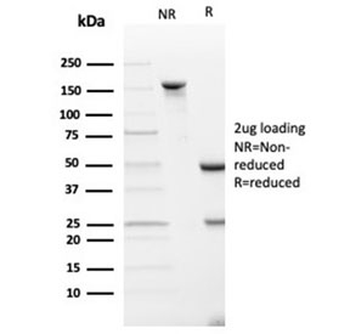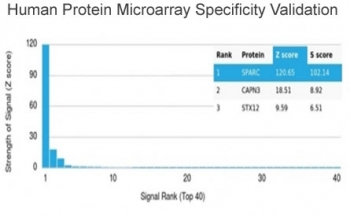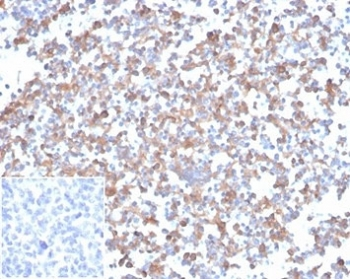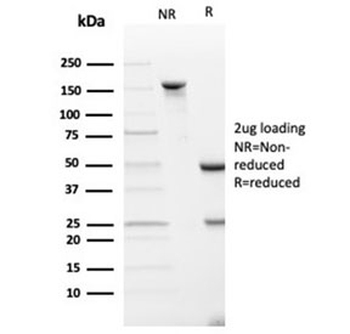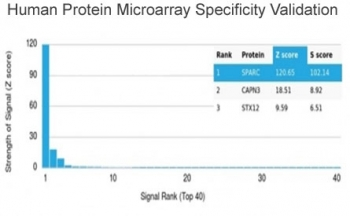You have no items in your shopping cart.
SPARC Antibody / Osteonectin
Catalog Number: orb2635238
| Catalog Number | orb2635238 |
|---|---|
| Category | Antibodies |
| Description | SPARC (for secreted protein acidic and rich in cysteine) is a phosphorylated, acidic, glycine-rich glycoprotein that is secreted by endothelial cells and is present in large amounts in the parietal endoderm of mouse embryos and in human placenta. It is identical to osteonectin, a protein important to bone calcification that is highly conserved between species. SPARC, which can be selectively expressed by the endothelium in response to certain types of injury, induces rounding in adherent endothelial cells in vitro. It regulates endothelial barrier function through F-Actin-dependent changes in cell shape, coincident with the appearance of intercellular gaps, which provide a paracellular pathway for extravasation of macromolecules. |
| Species/Host | Mouse |
| Clonality | Monoclonal |
| Clone Number | OSTN/3932 |
| Tested applications | IHC-P, WB |
| Reactivity | Human |
| Isotype | Mouse IgG2a, kappa |
| Immunogen | A portion of amino acids 1-200 was used as the immunogen for the SPARC antibody. |
| Dilution range | Western blot: 1-2ug/ml,Immunohistochemistry (FFPE): 1-2ug/ml |
| Conjugation | Unconjugated |
| Formula | 0.2 mg/ml in 1X PBS with 0.1 mg/ml BSA (US sourced), 0.05% sodium azide |
| Hazard Information | This SPARC antibody is available for research use only. |
| UniProt ID | P09486 |
| Storage | Maintain refrigerated at 2-8°C for up to 2 weeks. For long term storage store at -20°C in small aliquots to prevent freeze-thaw cycles. |
| Note | For research use only |
| Application notes | Optimal dilution of the SPARC antibody should be determined by the researcher. |
| Expiration Date | 12 months from date of receipt. |

Western blot testing of human JEG-3 cell lysate using SPARC antibody (clone OSTN/3932). Expected molecular weight: 35-43 kDa depending on glycosylation level.
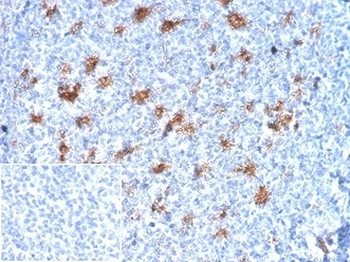
IHC staining of FFPE human tonsil tissue with SPARC antibody (clone OSTN/3932). Negative control inset: PBS used instead of primary antibody to control for secondary Ab binding. HIER: boil tissue sections in pH9 10mM Tris with 1mM EDTA for 20 min and allow to cool before testing.
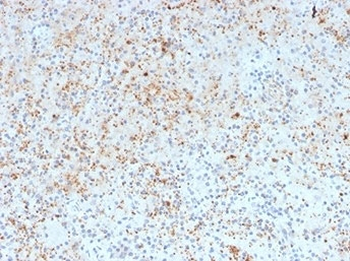
IHC staining of FFPE human spleen tissue with SPARC antibody (clone OSTN/3932). HIER: boil tissue sections in pH9 10mM Tris with 1mM EDTA for 20 min and allow to cool before testing.
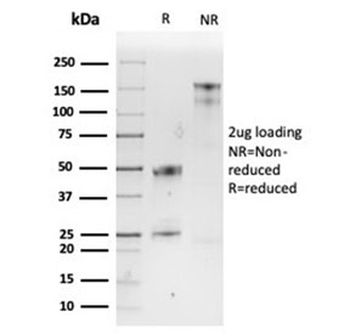
SDS-PAGE analysis of purified, BSA-free SPARC antibody (clone OSTN/3932) as confirmation of integrity and purity.
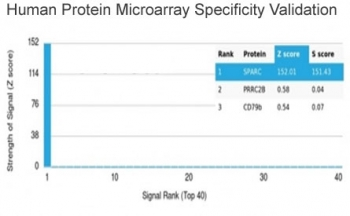
Analysis of HuProt (TM) microarray containing more than 19000 full-length human proteins using SPARC antibody (clone OSTN/3932). These results demonstrate the foremost specificity of the OSTN/3932 mAb. Z- and S- score: The Z-score represents the strength of a signal that an antibody (in combination with a fluorescently-tagged anti-IgG secondary Ab) produces when binding to a particular protein on the HuProt (TM) array. Z-scores are described in units of standard deviations (SD's) above the mean value of all signals generated on that array. If the targets on the HuProt (TM) are arranged in descending order of the Z-score, the S-score is the difference (also in units of SD's) between the Z-scores. The S-score therefore represents the relative target specificity of an Ab to its intended target.



